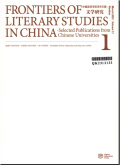On the Central Position of “Chanting to Express One’s Qing and Xing” in Classical Chinese Lyrical Poetics
“Chanting to express one’s qing (emotions) and xing (natural inclination)” holds a central position in a series of lyrical theories in Chinese classical poetics. Based on the philosophy of emotions and dispositions, this concept marks the development from the expression of aspirations and emotions in general and collective poetics prevalent in the pre-Qin period to the lyrical theory of individual poetics. The poetry of literati in the Han and Wei dynasties originated from the view of “expressing aspirations” and gave rise to the view of “springing from emotions.” During the Southern and Northern dynasties, poetic thought centered on qing and xing began to be established, and people often associated poetry with “chanting to express one’s qing and xing” in addition to the concepts of “expressing aspirations” and “springing from emotions.” The poetics of the Tang Dynasty absorbed the view of “Introduction to Mao’s Version of The Book of Odes” on the ballads and court hymns composed in the decline of the Zhou Dynasty and the theory of qing and xing from the Southern and Northern dynasties. Its fundamental assertion regarding poetry is “chanting to express one’s qing and xing,” and it endowed the traditional theory of qing and xing with an emphasis on individuality and a reverence for natural aesthetics. Despite advocating the didactic purpose, the poetics of the Tang Dynasty essentially aligned with the ballads composed in the decline of the Zhou Dynasty, “chanting to express one’s qing and xing.” In the Song Dynasty, the theory of qing and xing was combined with individual ethical essence, serving as the ideological foundation of the emphasis on reason in Song poetry. In the Ming and Qing dynasties, poets still followed the traditional theory of qing and xing, considering qing and xing as the foundation of poetry. Among them, the school of “expressing one’s inner self” emphasized the natural expression of individuality and valued inspiration and innovation.
lyrical poetics、 chanting to express one’s qing and xing、 expressing aspirations、 springing from emotions
18
2024-09-26(万方平台首次上网日期,不代表论文的发表时间)
共34页
119-152




